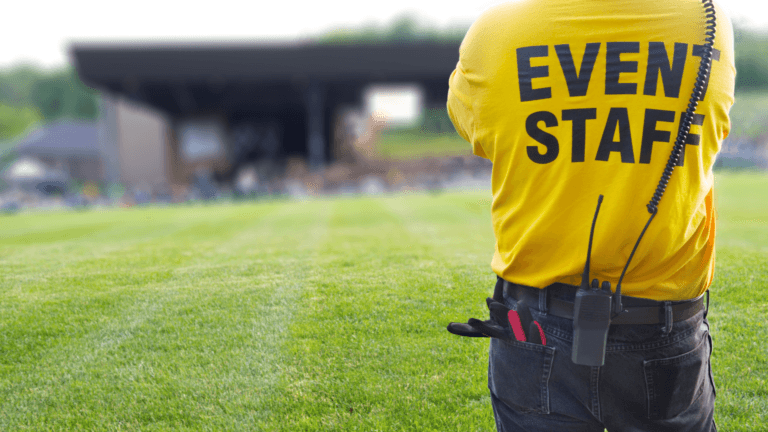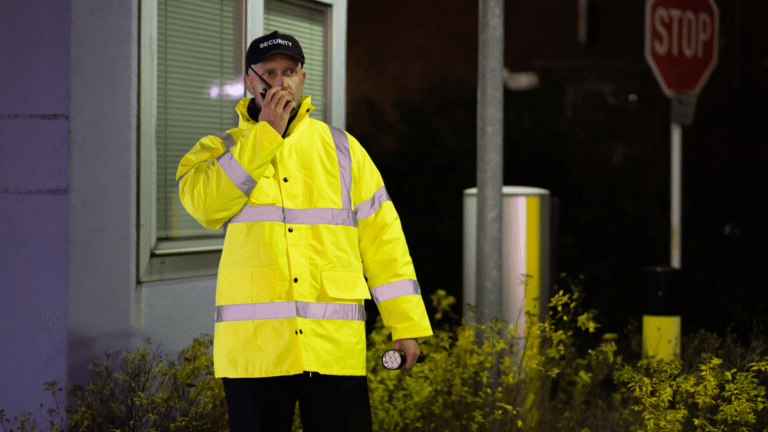Additional Considerations for Event Security
- Home -
- List Item
Introduction
Event security is much more than just having security personnel on-site. To create a secure environment for your attendees, it’s essential to consider a range of additional security measures that go beyond the basics. These extra precautions can address specific vulnerabilities and help ensure that your event runs smoothly.
In this article, we’ll explore some of the additional considerations for event security that can make all the difference in safeguarding your event, attendees, and staff.


Key Components of Event Security
1. Crowd Control: Managing Large Gatherings
Managing crowds effectively is critical to preventing accidents and maintaining order. A well-executed crowd control plan will help minimize chaos and ensure that attendees feel safe throughout the event.
- Barriers and Fencing: Use crowd control barriers to create clear pathways, prevent overcrowding, and guide attendees in an orderly manner.
- Trained Personnel: Employ security staff trained in crowd management to monitor the movement of people, especially in high-traffic areas such as entry points, stages, or concession stands.
- Clear Signage: Use large, visible signs to direct attendees to key areas like restrooms, exits, or information booths. Proper signage helps reduce confusion and bottlenecks.
Pro Tip:
For large-scale events, implement a zoning system, where attendees are split into designated areas, preventing overcrowding and making it easier for security personnel to monitor the crowd.
2. Alcohol and Drug Control: Ensuring Responsible Consumption
If your event allows the consumption of alcohol, it’s crucial to establish clear guidelines and ensure responsible drinking practices are enforced. This not only ensures the safety of attendees but also reduces the likelihood of disruptive behavior.
- Age Verification: Have a robust system in place to verify the legal drinking age, such as wristbands or ID checks.
- Limit Consumption: Set limits on how much alcohol can be purchased or consumed within a set period to prevent overindulgence.
- Sober Monitors: Deploy security personnel trained to identify signs of intoxication and to intervene when necessary. This helps ensure that individuals who have had too much to drink are managed safely and respectfully.
Pro Tip:
To further reduce the risk of alcohol-related incidents, provide alternative drink options such as water or non-alcoholic beverages and encourage attendees to stay hydrated.
3. Vendor Security: Safeguarding Booths and Merchants
Vendors are essential to many events, offering food, merchandise, or services to attendees. However, vendors are also vulnerable to theft or vandalism, especially during high-traffic events.
- Secure Vendor Areas: Create dedicated areas for vendors, ideally in a well-lit and monitored space. Position vendor booths near security checkpoints for added protection.
- Cash Management: Encourage vendors to use cashless payment systems where possible, minimizing the risk of theft. If cash is involved, provide vendors with secure cash storage options.
- Vendor Badges: Issue vendor-specific ID badges or passes, ensuring that only authorized personnel have access to sensitive areas like loading zones or storage facilities.
Pro Tip:
Assign a dedicated vendor security team to patrol vendor areas regularly, ensuring that any issues or concerns are promptly addressed.
4. Post-Event Review: Learning from Experience
Once your event has concluded, it’s essential to conduct a comprehensive review of the security measures in place. A post-event review allows you to identify strengths, areas for improvement, and potential oversights that can be corrected for future events.
- Security Team Debrief: Hold a meeting with security personnel to gather their feedback on what worked well and what didn’t. This helps to identify any gaps in the security plan.
- Attendee Feedback: Collect feedback from attendees via surveys or social media to gauge their perception of the event’s security. Were there any concerns or areas where they felt unsafe?
- Incident Reports: Review any incidents or emergencies that occurred during the event. Analyze how they were handled and what can be improved for the future.
Pro Tip:
Keep detailed notes and logs from each event, allowing you to build a database of what security measures were effective in various situations. This will be invaluable for future event planning.
5. Cybersecurity: Protecting Digital Infrastructure
In today’s digital age, it’s not only physical security that event organizers must consider—cybersecurity is equally important, especially for events that involve ticket sales, attendee data, or live streaming.
- Data Protection: Ensure that all attendee data, such as personal information or payment details, is stored securely and encrypted.
- Wi-Fi Security: If offering public Wi-Fi, implement a secure network with limited access to critical event systems. This prevents unauthorized access to sensitive information or systems.
- Monitoring: Assign an IT team to monitor online activity during the event, including the event’s website or app. This helps identify and respond to potential cyber threats in real-time.
Pro Tip:
Use multi-factor authentication for all online event systems, especially those handling sensitive information such as ticket sales or event scheduling platforms.
6. Health and Safety Protocols: Keeping Everyone Safe
In the wake of recent global health concerns, implementing health and safety protocols has become a standard part of event security planning. Ensuring that the event complies with local health regulations and provides adequate medical services is vital.
- Sanitization: Set up sanitization stations throughout the event, including entry points, restrooms, and food areas.
- First Aid: Have medical personnel and first aid stations on-site, prepared to respond to health emergencies quickly.
- Health Checks: Depending on local guidelines, consider implementing health checks, such as temperature screening or requiring proof of vaccination.
Pro Tip:
Collaborate with local health authorities to stay informed on any updated health and safety protocols or guidelines that must be followed during the event.
Conclusion
Event security goes beyond traditional physical measures; it requires attention to various aspects like crowd management, vendor safety, responsible alcohol consumption, and even cybersecurity. By taking these additional considerations into account, you can significantly improve the overall security of your event.
Remember, no matter the size or type of gathering, proactive security planning is essential. If you’re organizing an event and need expert security services, contact Unified Security Guard at info@unifiedsecurityguard.com. Our team is dedicated to ensuring your event is safe, secure, and successful.
FAQs
What is the best way to control crowds at an event?
Implementing crowd control barriers, signage, and employing trained personnel can help manage the flow of attendees and prevent overcrowding.
How can I prevent theft at vendor booths during my event?
Ensure that vendors are placed in secure, well-monitored areas. Encourage the use of cashless payments and provide secure storage options for vendors.
Should I hire a cybersecurity team for my event?
If your event involves attendee data, ticket sales, or live streaming, having a cybersecurity team to monitor and protect digital assets is a wise decision.
How do I handle alcohol consumption at my event?
Use age verification, monitor consumption, and train security staff to identify intoxication. Setting limits on alcohol purchases can also help maintain a safe environment.
